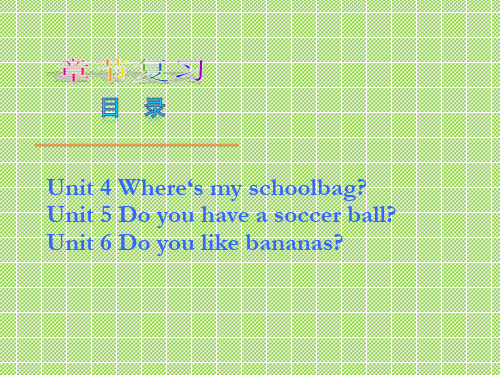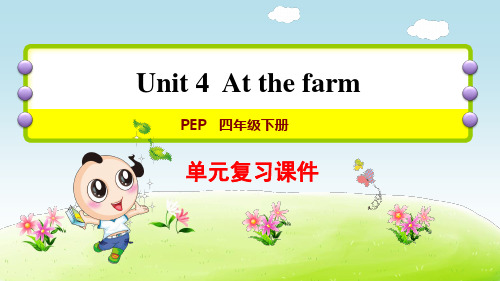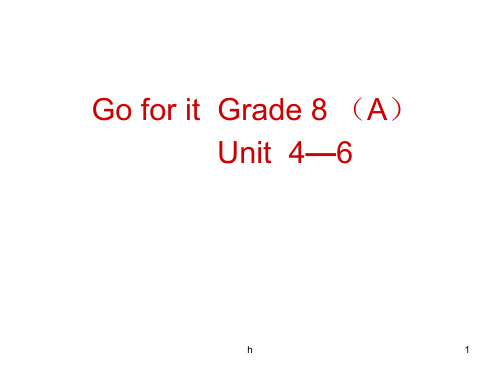Units4-6复习课件
合集下载
八上unit4-6复习课件zhang

总结词
掌握过去完成时的基本结构和用 法
详细描述
过去完成时用来描述在过去某一 时间之前已经完成的事情,其基 本结构是“had+过去分词”,常 用的时间状语有by、before等。
描述经常发生的动作或状态
总结词
掌握一般现在时的基本结构和用法
详细描述
一般现在时用来描述经常发生的动作或状态,其基本结构是“动词原形或第三人称单数形式”,常用的时间状 语有always、usually等。
复数形式
了解名词的复数形式,如“books”、 “pens”、“balls”等。
专有名词与普通名词
区分专有名词和普通名词,如“China”、 “Beijing”是专有名词,“book”、 “pen”是普通名词。
形容词
01
02
03
原级
掌握形容词的原级形式, 如“beautiful”、 “big”、“happy”等 。
What does he do after school? 他放学后通常做什么 ?
04
单元重点话题
描述正在进行的动作
总结词
掌握现在进行时的基本结构和用法
详细描述
现在进行时用来描述正在发生的动作或状态,其基本结构是“be动词+动词ing”,常用的时间状语有now、 right now等。
描述已经完成的事情
呼应开头法
结尾与开头相呼应,使文章结构更加 完整。
写作练习题
在此添加您的文本17字
根据所给材料写一篇短文
在此添加您的文本16字
材料:近年来,越来越多的人选择在节假日外出旅游,旅 游市场也因此蓬勃发展。请就此现象写一篇短文,谈谈你 的看法。
在此添加您的文本16字
2024年河北省中考英语冀教版一轮复习教材梳理课件:八年级(上册) Units 4-6

people travel all around 3. ___t_h_e__ world. People travel to see their 4. _f_a_m_i_li_e_s
(family), for work or just for fun. I would see the world and experience many 5.
interview people about 2. __t_h_e_ir__ (they) jobs. After a little planning, I went for 3.
__a_____ walk down the main shopping street in my neighbourhood.
突 破
allow doing sth. 意为“允许做某事”
allow 的用法 allow sb. to do sth. 意为“允许某人做某事”
be allowed to do sth. 意为“被允许做某事
如 :We don’t allow eating in the classroom. 我们不允许在教室里吃东西。 Her boss doesn’t allow her to use the telephone. 她的老板不允许她使用电话。
容 综
asked me this question many 2. _ti_m__es___ (time), but I don’t really know the
合 answer yet.
练
Maybe I’ll be an airplane pilot. That would be a cool job because I would help
容 综
Units4-6复习课件课件(人教新目标七年级上)

_______i_sn_'t___otnhe watch?
2.Her hat is on the chair. (改为否定句)
Are these
Her hat ________ ____ the chair.
3. These are my books.(改为一般疑问句)
___I_s___ ________o_n_ your books?
Unit 5┃ 基础知识梳理
we
9. 我们 _la_te______ 10. 迟到 网__球___w_a_tc_h___ 11. 注视;观乒看乓球_____________ 12. tenni班s 级_;__(一__节__)课____
相同的
13. ping-p爱o;ng喜爱______________ 14. class允_许__;_让__________________ 15.sam有e趣的______________ 16.love玩;__打_(_球_)_________ 17.let __________________
Unit 4┃ 基础知识梳理
3. “你的书在哪儿?” “它W们her在e o椅n 子ar上e 。” —___________ _______ your books? —They araere___in_ the chair. 4. 钥匙在书架上。 The keys ______ ____ the bookcase.
Unit 4 Where‘s my schoolbag? Unit 5 Do you have a soccer ball? Unit 6 Do you like bananas?
Unit 4 My name's Gina
Unit 4┃ 基础知识梳理
人教PEP版英语四年级下册复习PPT课件Unit4~Unit6复习PPT教学课件

tomato
__西__红__柿___ potato ___土__豆____
green beans ___豆__角____ carrot __胡__萝__卜___
these
___这__些____ sheep ___绵__羊____
hen cow horse those
__母__鸡_____ ___奶__牛____ ____马_____ ___那__些____
任务二:翻译重点句型
(两人一组,正确读出句子并翻译成汉语可得2分)
—Whose pants are these ? —They are your father ,s.
那些是谁的裤子? —Whose coat is this?
这是谁的外衣?
它们是你的爸爸的 。 —It, s mine.
它是我的。
—Are those yours? 那些是你的吗 ?
Unit 4 At the farm
PEP 四年级下册
单元复习课件
1、能够正确拼读本单元四会单词; 2、能熟练掌握和运用本单元重点句型; 3、掌握字母组合or的读音规则。
游戏规则: 按要求每完成一项任务即可获得相应的 分数,满10分即可获得一张王牌。
任务一:在习题本上写出以下单词的正确翻译并朗读 (可得2分)。
— ___C____
A. Yes, they aren’t.
B. No, they are.
C. No, they aren’t. 解析:AB选项前后矛盾排除。C选项正确,
(these sheep用they指代)它符合用Are these
问,就用Yes, they are或者No, they aren’t答。
任务五:在习题本上将下列单词补全并朗读(全对得2分)
八上unit 4--6复习课件zhang

Other students t_a_k__e_t_h_e__b_u_.sA small number of
students t_a_k_e__t_h_e__s_u_b_w__a_y__to__s_c_h. ool
h
7
Hi, Jeff! Can you come to my party on Saturday?
Yes, I can.
I’m sorry, I can’t.
I have to _v_is_i_t _m_y_a_u_n_t on Saturday.
give thhe reason
8
A: What’s today?
B: It’s _____ the __ th.
today tomorrow (was)yesterday the day after tomorrow
Number
of
40 100 175 30 50
students
ride their bikes At Garden High School, most students __________to
school.
Many studentsw_a_l_k__to__s_c_h_o_o_l.Some
students_d_r_i_v_e_.
3. My uncle __c_a_m__e_o_v_e_r _to__ my house to chat with father this morning.
5. We _b_e_a_t_____ No 2 Middle school in
basketball last Sunday.
6. It _t_o_o_k______ me four days to complete the
中考英语总复习 第1篇 基础考点夯实 九年级 Units 4-6课件 人教新目标版

• Not only did Mike pass the exam, but also he got good ma
• 迈克不仅通过了考试,而且他还得了高分。
• 6.I would rather stay at home and read a good book than to a party. 我宁可呆在家里面看本好书都不愿去参加晚会。
来表示否定推测,mustn’t意为“禁止;不允许”。
考点、易错点演练
考点 1
to do sth.害怕做某事 be afraidthat+从句恐怕……
Байду номын сангаас
考点 2
used to do 过去常常做
used to be 过去曾是;曾经
be/get used to doing
习惯做
• 4.It is believed that on December 21st, 1891, the first basketball game in history was played.
• 人们认为,历史上第一场篮球赛是在1891年12月21日举行的。(教 P46)
• 精析:“it is believed + that 从句”是英语中常用句型,意为“ 认为”,相当于“people believe that...”。类似的用法还有“it’ that...”(据说……)。
• (3) be/get used to doing “习惯做……”, to后跟动名词或代词、 • Her father is used to running in the morning. • 她爸爸习惯在早上跑步。 • (4) be used to do “被用来做……”, to后跟动词原型 • Glass is used to make into glasses. • 玻璃经常用于做成杯子。
• 迈克不仅通过了考试,而且他还得了高分。
• 6.I would rather stay at home and read a good book than to a party. 我宁可呆在家里面看本好书都不愿去参加晚会。
来表示否定推测,mustn’t意为“禁止;不允许”。
考点、易错点演练
考点 1
to do sth.害怕做某事 be afraidthat+从句恐怕……
Байду номын сангаас
考点 2
used to do 过去常常做
used to be 过去曾是;曾经
be/get used to doing
习惯做
• 4.It is believed that on December 21st, 1891, the first basketball game in history was played.
• 人们认为,历史上第一场篮球赛是在1891年12月21日举行的。(教 P46)
• 精析:“it is believed + that 从句”是英语中常用句型,意为“ 认为”,相当于“people believe that...”。类似的用法还有“it’ that...”(据说……)。
• (3) be/get used to doing “习惯做……”, to后跟动名词或代词、 • Her father is used to running in the morning. • 她爸爸习惯在早上跑步。 • (4) be used to do “被用来做……”, to后跟动词原型 • Glass is used to make into glasses. • 玻璃经常用于做成杯子。
Unit4-6复习(课件)人教PEP版英语四年级上册
Unit 6 Meet my family!
重点单词 • baby brother 婴儿小弟弟 aunt 阿姨,姑姑 • cousin 同辈表亲(或堂亲)uncle 叔叔,姑父 • parents 父母 doctor 医生 nurse 护士 • cook 厨师 driver 司机 farmer 农民
2、Where are the keys? Where is/are...? where引导的特殊疑问句。用于寻问位置。回 答为:人称代词+is/are+表示地点的介词短语。 eg:Where is my mother?
She is in the living room.
3、Open the door,please. 祈使句,表示命令,请求,劝告,禁止等句子。 please意为“请”,常用在祈使句的句首或句末。 祈使句的否定句,在祈使句前面加don't。 eg:Come in,please.
3、What's your aunt's job?你阿姨做什么的? She is a nurse. 她是一位护士。
job:工作,职业,可数 find a job:找一份工作 work:工作,不可数 问工作: What's sb's job? What do/does sb do? What is/are he/she/you/they?
四上U4-6复习
Unit 4 My home
重点单词 living room 客厅 bedroom 卧室 kitchen 厨房 bathroom 洗手间 study 书房 sofa 沙发 fridge 冰箱
table 桌子 phone bed 床
语音
• u /ʌ/:duck 鸭子 up 向上 cut 切 bus 公交车 fun 有趣的 us 我们
2015直击中考英语(人教版)总复习课件:第6讲 八年级上Units4~6(共24张PPT)
一、 What's the best movie theater?最好的电影院是什么? 【考点精讲】 形容词和副词的最高级表示三者或三者以上(人或事物)中某方面的程度最高。常与 in 短 语或 of/among 短语连用,说明比较的范围。常用结构:
in+集体单数 the+最高级 eg: of/among+名词复数
第六讲 八年级(上)Units 4~6
英 语
一、根据句意及首字母或汉语提示,填入恰当的单词。 1〃Gina likes science,and she wants to be a scientist when she grows up. 2〃She sent me an e-mail ten minutes ago. 3〃Discuss this problem in your group.Then you should tell me the answer. 4〃—What happened to Lucy last night? —She had a cold. 5〃My father told us a joke,and it made us laugh. 6〃There are four theaters(戏院)in our city. 7〃You can buy books the most cheaply(便宜地)in our bookstore. 8〃How about choosing(挑选)a red hat? 9〃Jack is a brave boy and wants to be a pilot(飞行员)in the future. 10〃My hobby(业余爱好)is collecting stamps.
二、选用方框中适当的单词 ,并用其正确形式填空。 everybody,fresh ,meal,win,carefully 11.Your sister cleans the car more_carefully than your cousin does. 12.Stay here and enjoy the fresh air. 13.Do you know the winner in yesterday's singing competition? 14.They are full now.They had a big meal just now. 15.She is a kind girl.Everybody likes her very much.
2021年中考英语第一轮复习教材梳理课件:人教七年级下册 Units 4~6
15. forgot; forgotten; remember 16. cut; cutting
七年级(下) Units 4~6
返回目录
重点单词 词块
词形词块 拓展
补充词块
重点句式
语法
17. using; useful; useless 18. importance
19. quietly
20. noisy
重点单词 词块
词形词块 拓展
补充词块
重点句式
语法
40. soup 43. house 46. pool 49. study 52. other 55. wish
返回目录
41. movie 44. tea 47. supermarket 50. state 53. young 56. delicious
语法
七年级(下) Units 4~6
返回目录
1. rule
单
A. n.规则;规章
B. n.习惯;常规;普遍情况
C. v.统治;控制
词
(1)They took control of the central plain of China in 1644
巩
and ruled the country for over 200 years until 1911.
考点3
考点4
七年级(下) Units 4~6
返回目录
考点1
如:How do I get to the Central Library?我
考点2
怎么去中央图书馆?[九(全) Unit 3 P 20]
My mother will arrive in Shijiazhuang soon.
初一英语上册Units4-6复习课件
• • •
Exercise
写出下列名词的复数形式: 1.desk ____ 2.class _____ 3. pencil-box _____ 4. watch _____ 5.dish _______ 6.month _____ 7.city _____ 8 Sunday _______ 9. half_______ 10.wife ______ 11.potato ____12.tomato_____ 13. zoo ____ 14. foot_______ 15 tooth_____ 16.child_____17.woman______18.Englishman_____ 19.German____20.Chinese _____21.Japanese_____ 22.American _______ 23.sheep______ 24. a man doctor _____
将下列句子改为复数句.
1.This is my dictionary. ______ ____ our_________. These are dictionaries 2.Where is his watch? Where___ their________? are watches 3. That flower is very beautiful(美丽 ). Those flowers are _______________ very beautiful.
形容词性的物主代词见下表:
形容 my your his 词性 代词 中文 我 的 her its our your their
你的 他的 她的 它的 我们 你们 他们的 的 的
名词性物主代词?
名词所有格的构成形式
• 一.-’s所有格:-’s所有格主要用来表示有生命的东西的名词。’s所有格的构成形式如下: • 1.单数名词在词尾直接加“’s ”。 如:Kangkang’s father 康康的父亲 Mary’s mother玛丽的妈妈 my brother’s car 我弟弟的车 • 2.以-s结尾的复数名词在词尾只加“’”。如:the students’ book学生用书 the teachers’ office老师的办公室 the twins’ bags 双胞胎的书包 • 3不以-s结尾的复数名词在词尾加“’s”。如:women’s bikes 女式自行车 Men’s shoes 男式鞋子 Children’s Day 儿童 节 • 5.如果一样东西为两人或几人共同所共有,则在最后一个名词的词 尾加“’s”;如果分别属各自所有时,则在各个名词词尾都加 “’s”。 如:Jim and Kate’s house吉姆和凯特的家 Mr and Mrs Smiths’ son史密斯夫妇的儿子 Mike’s and Jack’s rooms 迈克的房间和杰克的房间 • 6.合成名词一般在最后一个词上加“-’s”,但是有一种特殊情况,如 • a man teacher ---- men teachers • a woman doctor----- women teachers
- 1、下载文档前请自行甄别文档内容的完整性,平台不提供额外的编辑、内容补充、找答案等附加服务。
- 2、"仅部分预览"的文档,不可在线预览部分如存在完整性等问题,可反馈申请退款(可完整预览的文档不适用该条件!)。
- 3、如文档侵犯您的权益,请联系客服反馈,我们会尽快为您处理(人工客服工作时间:9:00-18:30)。
We cleaned our classroom just now.
7.They used this room for resting.
This room was used for resting by them.
总结小练笔: 1.Many people speak English.
English is spoken by many people .
Mike used to be shy, didn’t he?
Mike以前很害羞,是不是? 反意疑问句: 陈述句, didn’t / usedn’t +
主语?
完成句子
1. Mary过去很文静。 used _______ to _______ be very quiet. Mary _______
The work is done by Lucy in the evening. puters are often used by us in class. We often use computers in c Beijing. These machines are made in Beijing.
2. 我过去放学后常踢足球。 used _______ to _______ play soccer after I _______ school.
句型转换 1.He used to take a walk in the park. (改为否定句) didn’t _______ use usedn’t to take a He _______ / _______ walk in the park here.
I was given a book (by him). A book was given to me (by him). He passed me a ticket. → I was passed a ticket (by him). A ticket was passed to me (by him). My father bought me a new bike. → I was bought a new bike (by my father). A new bike was bought for me (by my father).
He looked after his brother yesterday. 主 谓 宾
His brother was looked after by him yesterday .
Tom will clean the room tomorrow. 主
谓
宾
The room will be cleaned by Tom tomorrow.
The bike will be repaired by her tomorrow..
“双宾语”改被动语态,直接宾语(物)作主语,那么动词后要用 介词.(这个介词是由与其搭配的动词决定) pass、bring、buy、 show、send、 give、cook等。把指“人”的间接宾语变主语,“物”不变。 He gave me a book. → 变直接宾语加to .变间接宾语不加
Sarah can do the dish 主
谓
宾
The dish can be done
by Sarah
1.They play football on Sunday. Football is played by them on Sunday. 2.Lucy does the work in the evening.
5.He took good care of his little brother yesterday.
His little brother was taken good care of by him yesterday.
6.Our classroom was cleaned by us just now.
2. She used to hang out with friends on weekends. (改为一般疑问句并作肯定和否定回答)
Did she _______ --- _______ hang out with use _______ to friends on weekends? did --- Yes,she _______. / --- No, she _______. didn’t / usedn’t didn’t 3. Lucy used to cry, ___________ (完成反意疑问句) she?
否定形式为:didn’t use to do 或:used not to do 疑问形式为:Used … to …? :
或:Did … use to …?
Gina used to have short hair. ①变为一般疑问句:
Did Gina use to have short hair? _____________________________. Used Gina to have short hair? _____________________________.
Units 4- 6(语法)
Unit 4 I used to be afraid of the dark. Unit 5 What are the shirts made of?
Unit 6 When was it invented?
“used to + 动词原形”表过去的习 惯或过去经常反复发生的动作或状态, 但现在已经不再存在了。可用于所有人 称。
用括号内所给动词的适当形式填空。 1.My sister used to _______ (be) a teacher. be washing (wash) my face with 1. I’m used to _______ cold water. 1. Wood is used for producing ________ (produce) paper.
.
课堂小结
1. used to 的用法 2. 被动语态的用法
2. She _______ listen to classical music, but now she _______ listening to pop music. A. used to; used to B. is used to; is used to C. is used to; used to D. used to; is used to 3. As we know, elephants _______ some heavy jobs. A. are used to do B. are used to doing C. used to D. used to doing
被动语态
1. 英语有两种语态:主动语态和被动语态 主动语态表示是动作的执行者
被动语态表示主语是动作的承受者
Cats eat fish. (主动语态)猫吃鱼。 (被动语态)鱼被猫吃。
Fish is eaten by cats. 2. 被动语态的构成
be +及物动词的过去分词
be 有人称、数和时态的变化
②进行肯定回答:
Yes, she did. / Yes, she used to. _____________________________.
③变为否定句:
Gina didn’t use to have short hair. / . _____________________________
Gina usedn’t to have short hair. _____________________________.
主动语态变被动语态的步骤(宾主换,谓被动) 1.主动语态的宾语变为被动语态的主语;
2.主动句的谓语动词变为被动结构; 3.主动句的主语变为被动句的宾语,由by 引出,当不强调动作的执行者时,常省略。
改为被动语态
His brother watches TV
主语 谓语 宾语
every day.
TV
is watched by his brother every day.
几种时态的被动语态构成 一般现在时: 主语+ am/is /are + 过去分词
各种时态的被动语态构成
一般过去时: 主语+ was/were + 过去分词
一般将来时: 主语 + will be + 过去分词
情态动词:主语 + 情态动词 + be + 过去分词
现在完成时: 主语+ have/has + been+ 过去分词
2.People used knives for cutting things.
Knives are used for cutting things (by people).
4.We should clean the classroom every day. The classroom should be cleaned by us every day. 5.She will repair the bike tomorrow.
7.They used this room for resting.
This room was used for resting by them.
总结小练笔: 1.Many people speak English.
English is spoken by many people .
Mike used to be shy, didn’t he?
Mike以前很害羞,是不是? 反意疑问句: 陈述句, didn’t / usedn’t +
主语?
完成句子
1. Mary过去很文静。 used _______ to _______ be very quiet. Mary _______
The work is done by Lucy in the evening. puters are often used by us in class. We often use computers in c Beijing. These machines are made in Beijing.
2. 我过去放学后常踢足球。 used _______ to _______ play soccer after I _______ school.
句型转换 1.He used to take a walk in the park. (改为否定句) didn’t _______ use usedn’t to take a He _______ / _______ walk in the park here.
I was given a book (by him). A book was given to me (by him). He passed me a ticket. → I was passed a ticket (by him). A ticket was passed to me (by him). My father bought me a new bike. → I was bought a new bike (by my father). A new bike was bought for me (by my father).
He looked after his brother yesterday. 主 谓 宾
His brother was looked after by him yesterday .
Tom will clean the room tomorrow. 主
谓
宾
The room will be cleaned by Tom tomorrow.
The bike will be repaired by her tomorrow..
“双宾语”改被动语态,直接宾语(物)作主语,那么动词后要用 介词.(这个介词是由与其搭配的动词决定) pass、bring、buy、 show、send、 give、cook等。把指“人”的间接宾语变主语,“物”不变。 He gave me a book. → 变直接宾语加to .变间接宾语不加
Sarah can do the dish 主
谓
宾
The dish can be done
by Sarah
1.They play football on Sunday. Football is played by them on Sunday. 2.Lucy does the work in the evening.
5.He took good care of his little brother yesterday.
His little brother was taken good care of by him yesterday.
6.Our classroom was cleaned by us just now.
2. She used to hang out with friends on weekends. (改为一般疑问句并作肯定和否定回答)
Did she _______ --- _______ hang out with use _______ to friends on weekends? did --- Yes,she _______. / --- No, she _______. didn’t / usedn’t didn’t 3. Lucy used to cry, ___________ (完成反意疑问句) she?
否定形式为:didn’t use to do 或:used not to do 疑问形式为:Used … to …? :
或:Did … use to …?
Gina used to have short hair. ①变为一般疑问句:
Did Gina use to have short hair? _____________________________. Used Gina to have short hair? _____________________________.
Units 4- 6(语法)
Unit 4 I used to be afraid of the dark. Unit 5 What are the shirts made of?
Unit 6 When was it invented?
“used to + 动词原形”表过去的习 惯或过去经常反复发生的动作或状态, 但现在已经不再存在了。可用于所有人 称。
用括号内所给动词的适当形式填空。 1.My sister used to _______ (be) a teacher. be washing (wash) my face with 1. I’m used to _______ cold water. 1. Wood is used for producing ________ (produce) paper.
.
课堂小结
1. used to 的用法 2. 被动语态的用法
2. She _______ listen to classical music, but now she _______ listening to pop music. A. used to; used to B. is used to; is used to C. is used to; used to D. used to; is used to 3. As we know, elephants _______ some heavy jobs. A. are used to do B. are used to doing C. used to D. used to doing
被动语态
1. 英语有两种语态:主动语态和被动语态 主动语态表示是动作的执行者
被动语态表示主语是动作的承受者
Cats eat fish. (主动语态)猫吃鱼。 (被动语态)鱼被猫吃。
Fish is eaten by cats. 2. 被动语态的构成
be +及物动词的过去分词
be 有人称、数和时态的变化
②进行肯定回答:
Yes, she did. / Yes, she used to. _____________________________.
③变为否定句:
Gina didn’t use to have short hair. / . _____________________________
Gina usedn’t to have short hair. _____________________________.
主动语态变被动语态的步骤(宾主换,谓被动) 1.主动语态的宾语变为被动语态的主语;
2.主动句的谓语动词变为被动结构; 3.主动句的主语变为被动句的宾语,由by 引出,当不强调动作的执行者时,常省略。
改为被动语态
His brother watches TV
主语 谓语 宾语
every day.
TV
is watched by his brother every day.
几种时态的被动语态构成 一般现在时: 主语+ am/is /are + 过去分词
各种时态的被动语态构成
一般过去时: 主语+ was/were + 过去分词
一般将来时: 主语 + will be + 过去分词
情态动词:主语 + 情态动词 + be + 过去分词
现在完成时: 主语+ have/has + been+ 过去分词
2.People used knives for cutting things.
Knives are used for cutting things (by people).
4.We should clean the classroom every day. The classroom should be cleaned by us every day. 5.She will repair the bike tomorrow.
